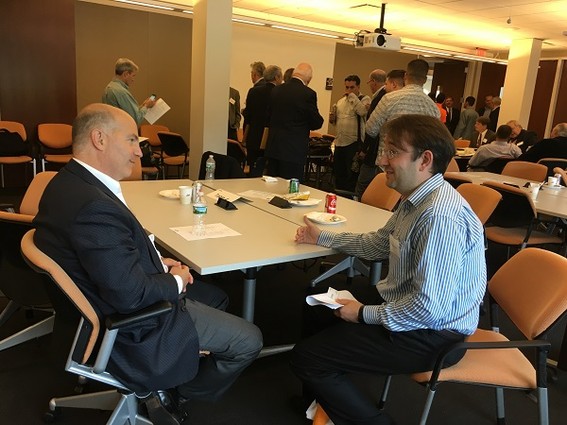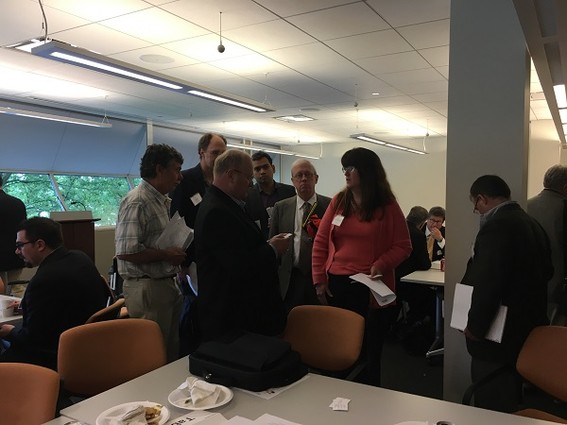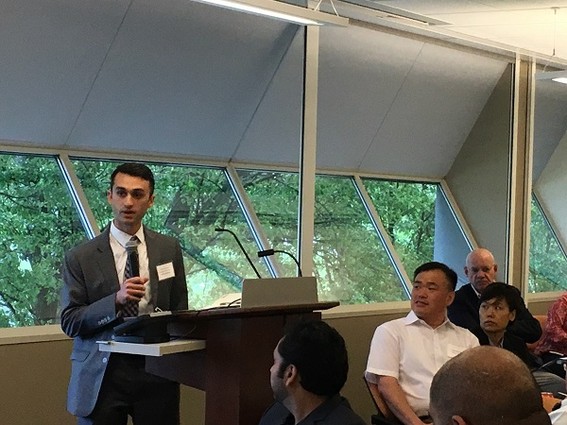Meet Some of the Angel Investors Who Fund New Jersey Startups, Part Two
The New Jersey Entrepreneurial Network’s annual Gathering of Angels, held on June 8, presented a rare opportunity for entrepreneurs to have short meetings with angel investors. Seven investors came to the meeting, representing themselves as well as several angel groups.
Prior to these meetings, in a “reverse venture fair format,” the angels briefly introduced their groups. They then provided some advice to the startup entrepreneurs at the event who were hoping to attract their attention. In part two we present Yaniv Sneor, Jerry Creighton Sr. and Jonathan Hakakian. Part One of this article can be found here.

Yaniv Sneor
Yaniv Sneor, representing Mid Atlantic Bio Angels (New York, N.Y.), told the group that he was a former physicist, but left the field a long time ago. “I fell in love with the business world. I started companies. I ran them. I turned them around. I bought and sold companies.” After selling his last company, he became “an accidental consultant,” and also started a life-sciences-themed investor group. “We invest exclusively in life science. … We like the deep IP [intellectual property] stuff. We do devices, diagnostics and therapeutics.”
Mid Atlantic Bio Angels invests all over the world, he said. Member angels are from the pharma and biotech industries. “People invest in what they know and like, and we know and like this area, so we invest in it. … We don’t feel we can gauge the chances for success of other companies in other fields, so we stay away from those because that’s a good way to lose money.”
Sneor said that it’s hard to define a typical investment for Mid Atlantic Bio Angels. The first company they invested in was a British firm that has since moved to the United States. “We are about to put in a third round into them, and we’ll be in for $10.5 million for just our group. This is very, very large for an angel group. This is not syndicated. We couldn’t syndicate originally because they were in the U.K.”
The angels in the group invest individually, but they have recently begun an internal investment pool. “We vote on whether the pool invests in a company,” Sneor said. This method enables the angel group to take more chances on more opportunities as they come along, with smaller amounts of money, he explained. And investors sometimes invest alongside that pool. “We are in the process of making an investment through that mechanism right now.”
Sneor also pointed out that all of the investors in the group are employed, so nobody is just a VC doing nothing but investments. Therefore it is essential to respect their time, as some of the other angels also said.
If you want to apply, don’t contact the group directly. “We ask people not to come to us, not to talk to us. We ask them to go to our website. We put our investment criteria up there; we ask you to self-select to make sure you fit our criteria. If you do, then send us an application.” Once an application is received, the group discusses it before deciding whether or not to invite the applicant in.
If a startup is invited to present, “we will tell you immediately afterwards if you will not receive money,” or if you will go to due diligence. If the group decides not to bring you in for whatever reason, “we tell you why not because, A, we may be wrong and you can tell us why we are wrong, and B, we’d like to give you some advice. Maybe something will happen and you can use that advice to do better later on. We welcome you to come back to us and say, ‘I’ve taken your advice’ or ‘things have changed and I’d like to reapply.’”
Advice: Sneor said that he doesn’t believe many entrepreneurs realize how important the individuals running the company are to the investor. “We will often take a look at a very risky technology just because we like the entrepreneurs, because they have a good track record, because we know what they’ve done, because they’ve impressed us favorably. … If we think the management is risky, it doesn’t matter how nice the technology is.”

Jerry Creighton Sr.
Jerry Creighton Sr., whom many entrepreneurs know as the executive director of the NJIT Enterprise Development Center, represented the NJIT Highlanders Angel Network (Newark). The Highlanders were established as a way to extend the entrepreneurial nature of the university, he said. At the NJIT-EDC, “we learned that a lot of companies need help at all different stages, so we help them come through to the process of commercialization.” But after that, they needed funding, and “so we started the angel network.”
Highlanders syndicates with other angel groups. “The last deal we closed, we closed with three other angel networks that are in this room today,” said Creighton. Highlanders invests in companies that have IT and software, and “we are doing some life science investing,” he said. “What we do uniquely with life science is, if we see a company that isn’t quite ready for funding yet, but they have applied, we will bring in resources. … So, for example, if you are a life science company and you need someone to help you with your product development, proof of clinic [trial] process, we will bring in people to help you along. We don’t just desert somebody because they are not quite ready yet.”
The angel network also matches the companies they support with talent such as coaches or CTOs. Creighton said that the Highlanders Angel Network doesn’t restrict itself to NJIT-EDC companies. “They can be from all over,” he told the group.
Advice: The most important thing when seeking funding from angel networks is to get ready, and actually be ready. Get the business model correct. The business model is the key, and the business model drives the business plan. “We teach coaching of the Business Model Canvas,” Creighton said. “The other thing I want to see is that the financial plan syncs with the business plan. So many times it doesn’t, and you don’t have enough money in the business plan to pay us if, in fact, we were to exit.” Creighton added that “when you go in to see an investor, have a term sheet ready. Know what you are looking for.” He also said that investors should have their due diligence books ready.

Jonathan Hakakian
Presenting last was Jonathan Hakakian, of SoundBoard Angel Fund (Morristown). “We launched in 2012. We are an early-stage seed fund very much led by our angel investors,” he said. “We are an angel investor fund, but we invest as a unit, and we have the fund committed up front. We are very democratic, which makes my life difficult, as I wrangle the cats and get everyone on the same page.”
The fund has 37 investors and 18 portfolio companies; and because of its democratic setup and range of investors, SoundBoard goes into a lot of different industries, he noted. “But we don’t get super technical. We don’t do drugs.” Instead, they try to “stay in the understandable business realm.” According to Hakakian, that means “when you give the pitch, we ask that the problem being solved or the solution being offered is understandable by the lay investor.” SoundBoard operates in the Northeast U.S.
“A lot of people ask me why angels like to be local,” said Hakakian. “It’s because we want to support our companies. We want to be able to tap into our networks to help them out. There have also been studies that say when investors can have direct access [to investors], there is more innovation from those companies.”
SoundBoard looks for a great team first, as well as a founder-market and founder-company fit. Then it wants market validation. They want to know “that you are thinking about revenue, that you are not just banking on a lot of eyeballs, and that you are scalable.” He added, “We are in this for the exit, so we do want to see how you are going to get there.”
SoundBoard tries to give as much beneficial feedback as possible after a pitch, said Hakakian. Execution is key, he noted. And during due diligence, “we try to suss out what your leadership style is, where you’ve been, where you are going and how you execute. The diligence process is an interview both ways. We want to make sure we are comfortable with the entrepreneurs, but also that they love us. I tell all the portfolio companies: ‘You are stuck with us for a very long time. You’d better like us, you’d better love us. You’d better want to pick up my phone call when I call you. If that’s not the case, it’s a mismatch.’”
Advice: “When you are approaching investors for funding, you have to remember that you are selling your business, not the product. You could have the best widget out there or the best service out there, but when you are coming to us, we are buying your business. We are not buying that widget. … So keep that in mind when you are coming to pitch. And pitch the business, not the product or service.”

